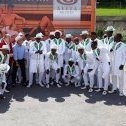I want to say that I got this article from earlier in this thread, but it could've been from the discussion in the "Supremes" thread.
https://www.theatlantic.com/ideas/archive/2022/05/south-abortion-pro-life-protestants-catholics/629779/
But basically what yall are describing in Ireland and Italy was part of our political spectrum before Jerry Fallwell and the rest of the religious right got involved in the 80s.
Before the mid-1970s, active opposition to abortion in the United States looked almost exactly like opposition to abortion in Britain, Western Europe, and Australia: It was concentrated mainly among Catholics. As late as 1980, 70 percent of the members of the nation’s largest anti-abortion organization, the National Right to Life Committee, were Catholic. As a result, the states that were most resistant to abortion legalization were, in most cases, the states with the highest concentration of Catholics, most of which were in the North and leaned Democratic.
This fit the pattern across the Western world: Countries with large numbers of devout Catholics restricted abortion, while those that were predominantly Protestant did not. Sweden—where Catholics made up less than 1 percent of the population—legalized some abortions as early as the 1930s; Ireland did not follow suit until 2018.
If the United States had followed this script, opposition to abortion probably would have weakened with the decline of Catholic-church attendance rates. Like Canada and England, where the leading conservative parties are overwhelmingly supportive of abortion rights, the Republican Party in the United States might have remained what it was for most of the 1970s: a heavily Protestant party whose leaders generally leaned in favor of abortion rights.
..........................................................................
Only a minority of white evangelical Protestants were politically progressive; the majority (especially in the South) were conservative, and they combined their commitment to moral regulation with a faith in free-market economics and opposition to social-welfare spending. American evangelicalism had long been the most individualistic of the nation’s Christian traditions, and in keeping with that individualistic theology of sin and salvation, most white evangelicals thought that the government’s interest in morality extended only to the punishment of individual vice, not the reduction of poverty. Thus, as the anti-abortion movement’s political influence shifted away from Catholic states toward evangelical-Protestant regions, it abandoned its earlier calls for federal antipoverty programs, expanded maternal-health insurance, and federally funded day care, and instead focused exclusively on the narrower issue of overturning Roe v. Wade and making abortion illegal.
A few activists (including a number of the northern Catholic veterans of the movement) remained committed to poverty relief and a comprehensive culture-of-life ethic, but with the Democratic Party’s current unequivocal endorsement of abortion rights, some of them felt politically homeless. Those activists began voting Republican despite their reservations about the party’s stances on social-welfare issues—which brought them into alliance with the southern evangelical conservatives who now had the political power to restrict abortion in their region.




